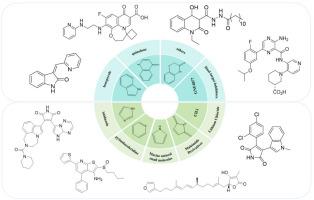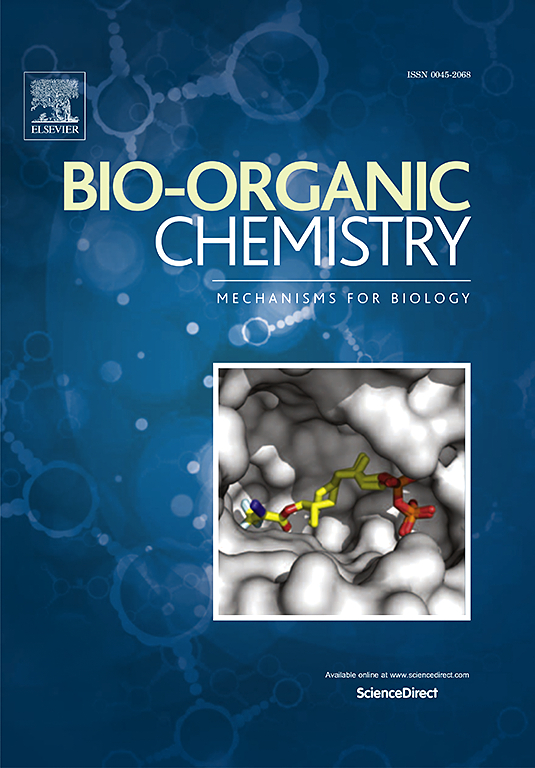糖原合成酶激酶3β靶向治疗糖尿病的研究进展
IF 4.7
2区 医学
Q1 BIOCHEMISTRY & MOLECULAR BIOLOGY
引用次数: 0
摘要
糖尿病是一种以高血糖为特征的慢性代谢性疾病,是由胰岛素分泌绝对或相对缺乏和胰岛素利用受损引起的。新增内容如下:糖尿病通常分为两种主要类型:1型糖尿病(T1DM)和2型糖尿病(T2DM)。1型糖尿病主要是由自身免疫系统对胰腺β细胞的错误攻击引起的,导致β细胞损伤和胰岛素分泌绝对不足。遗传因素在其发病机制中起重要作用。相比之下,2型糖尿病的发病机制更为复杂,主要涉及胰岛素抵抗和相对胰岛素缺乏。其发病与遗传因素和生活方式密切相关,高热量饮食、体育活动不足和肥胖是重要的危险因素。尽管它们的致病机制不同,但胰岛素在这两种糖尿病中都起着极其重要的作用。糖原合成酶激酶3 (GSK3)是一种高度保守的能激活糖原合成酶的激酶。GSK3β是葡萄糖代谢途径的关键分子,参与多种细胞活动,在多种疾病中发挥重要作用。因此,药物抑制GSK3β的活性和表达是治疗糖尿病的一种很有前景的方法。近年来,GSK3与肥胖动物模型和肥胖2型糖尿病(T2DM)患者的骨骼肌胰岛素抵抗有关。它通过抑制糖原合成酶导致葡萄糖产量增加和胰岛素敏感性降低。这些发现表明,利用特异性和敏感的GSK3抑制剂的研究为GSK3在调节胰岛素对葡萄糖在肌肉中的转运中的作用提供了新的见解。然而,直接靶向GSK3β的糖尿病治疗药物尚未被批准在全球上市。本文描述了GSK3β在糖尿病中的作用,阐明了GSK3β在细胞信号通路中的核心作用,并总结了治疗糖尿病的GSK3β抑制剂。最后,我们希望这些最新的研究进展将有助于发现安全有效的治疗糖尿病的GSK3β抑制剂。本文章由计算机程序翻译,如有差异,请以英文原文为准。

Advances in targeting glycogen synthase kinase 3β for diabetes therapy
Diabetes mellitus is a chronic metabolic disease characterized by hyperglycemia, which is caused by absolute or relative insulin deficiency in secretion and impaired insulin utilization. The newly added content is as follows: Diabetes mellitus is typically classified into two main types: type 1 diabetes (T1DM) and type 2 diabetes (T2DM). Type 1 diabetes primarily arises from the erroneous attack on pancreatic β-cells by the autoimmune system, resulting in β-cell damage and an absolute deficiency in insulin secretion. Genetic factors play a crucial role in its pathogenesis. In contrast, the pathogenesis of type 2 diabetes is more complex, mainly involving insulin resistance and relative insulin deficiency. Its onset is closely linked to both genetic factors and lifestyle, with high-calorie diets, insufficient physical activity, and obesity being significant risk factors.Despite the differences in their pathogenic mechanisms, insulin plays an extremely important role in both types of diabetes. Glycogen synthase kinase 3 (GSK3) is a highly conserved kinase that can activate glycogen synthase. As a key molecule in the glucose metabolic pathway, GSK3β is involved in various cellular activities and plays a crucial role in multiple diseases. Therefore, pharmacological inhibition of the activity and expression of GSK3β represents a promising approach for the treatment of diabetes. In recent years, GSK3 has been implicated in skeletal muscle insulin resistance in obese animal models and obese individuals with type 2 diabetes mellitus (T2DM). It leads to increased glucose production and decreased insulin sensitivity by inhibiting glycogen synthase. These findings indicate that studies utilizing specific and sensitive GSK3 inhibitors have provided new insights into the role of GSK3 in regulating the effect of insulin on glucose transport in muscles. However, diabetes therapeutic drugs targeting GSK3β directly have not yet been approved for marketing worldwide. Herein, we describe the role of GSK3β in diabetes, clarify the central role of GSK3β in cellular signaling pathways, and summarize GSK3β inhibitors for the treatment of diabetes. Finally, we hope that these latest research advances will facilitate the discovery of safe and effective GSK3β inhibitors for the treatment of diabetes.
求助全文
通过发布文献求助,成功后即可免费获取论文全文。
去求助
来源期刊

Bioorganic Chemistry
生物-生化与分子生物学
CiteScore
9.70
自引率
3.90%
发文量
679
审稿时长
31 days
期刊介绍:
Bioorganic Chemistry publishes research that addresses biological questions at the molecular level, using organic chemistry and principles of physical organic chemistry. The scope of the journal covers a range of topics at the organic chemistry-biology interface, including: enzyme catalysis, biotransformation and enzyme inhibition; nucleic acids chemistry; medicinal chemistry; natural product chemistry, natural product synthesis and natural product biosynthesis; antimicrobial agents; lipid and peptide chemistry; biophysical chemistry; biological probes; bio-orthogonal chemistry and biomimetic chemistry.
For manuscripts dealing with synthetic bioactive compounds, the Journal requires that the molecular target of the compounds described must be known, and must be demonstrated experimentally in the manuscript. For studies involving natural products, if the molecular target is unknown, some data beyond simple cell-based toxicity studies to provide insight into the mechanism of action is required. Studies supported by molecular docking are welcome, but must be supported by experimental data. The Journal does not consider manuscripts that are purely theoretical or computational in nature.
The Journal publishes regular articles, short communications and reviews. Reviews are normally invited by Editors or Editorial Board members. Authors of unsolicited reviews should first contact an Editor or Editorial Board member to determine whether the proposed article is within the scope of the Journal.
 求助内容:
求助内容: 应助结果提醒方式:
应助结果提醒方式:


